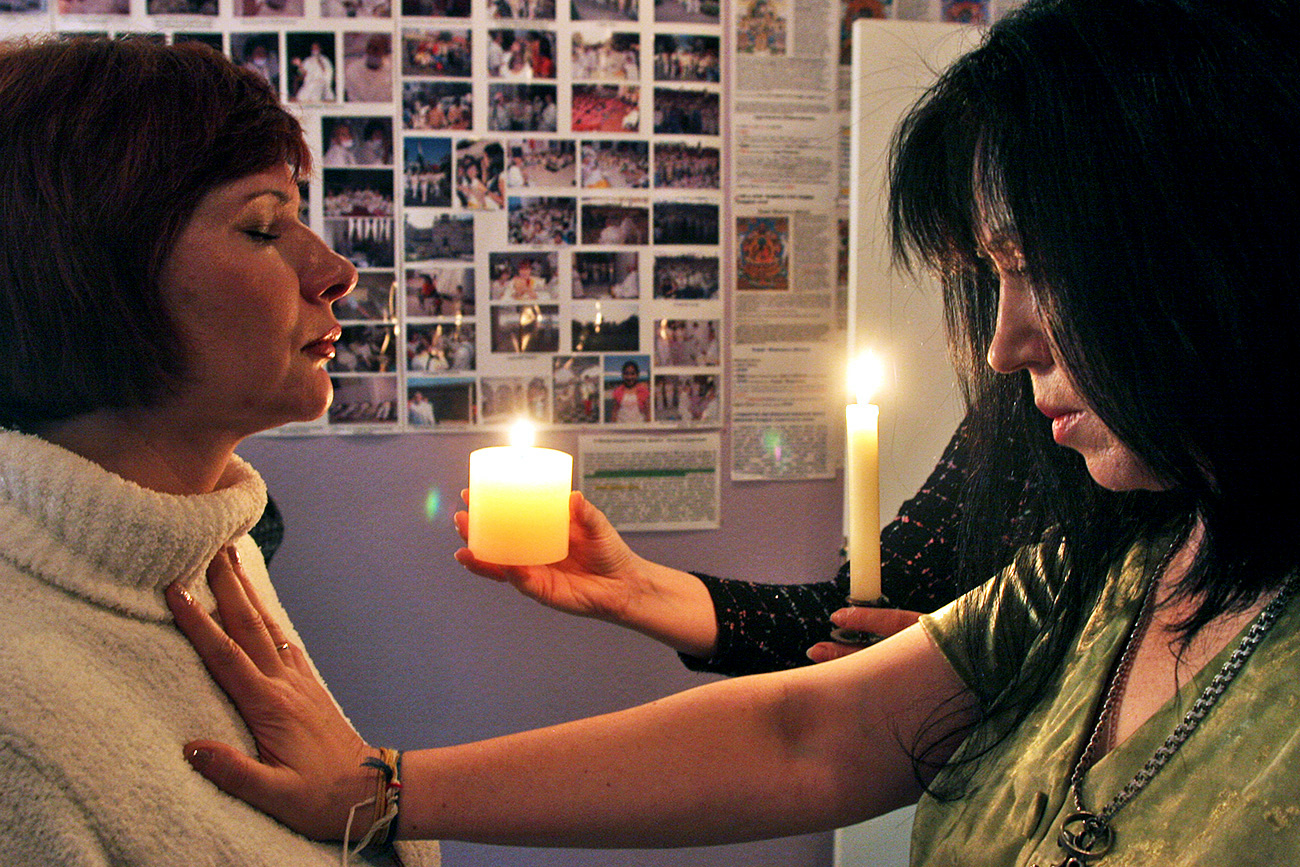
Disciples undergo an initiation ceremony at the "Iklin" Centre for Psychology and Classical Cosmoenergetics.
Valery Matytsin/TASSA man in latex gloves is neatly placing photographs of famous people on a table. He covers each photograph with a thick sheet of white paper and then shines a flashlight on them, to ensure that the photo cannot be seen through the paper. Next to him, a young girl is measuring the spaces between the photographs with a ruler, making sure that the distance between Barack Obama, Adolf Hitler and the world's first cosmonaut, Yuri Gagarin, is at least 30 cm.
Two years ago an independent Harry Houdini Award was set up in Moscow. Under its conditions, the founders will pay one million rubles (about $18,000) to anyone who can prove their paranormal abilities in front of skeptics. We are observing one such attempt now.
"Do not touch the table or the photographs! You will destroy the aura!" warns a member of the organizing committee, Mikhail Lidin. He wears a t-shirt with a printed portrait of the famous illusionist Houdini, who seems to be looking at these activities with unconcealed contempt.
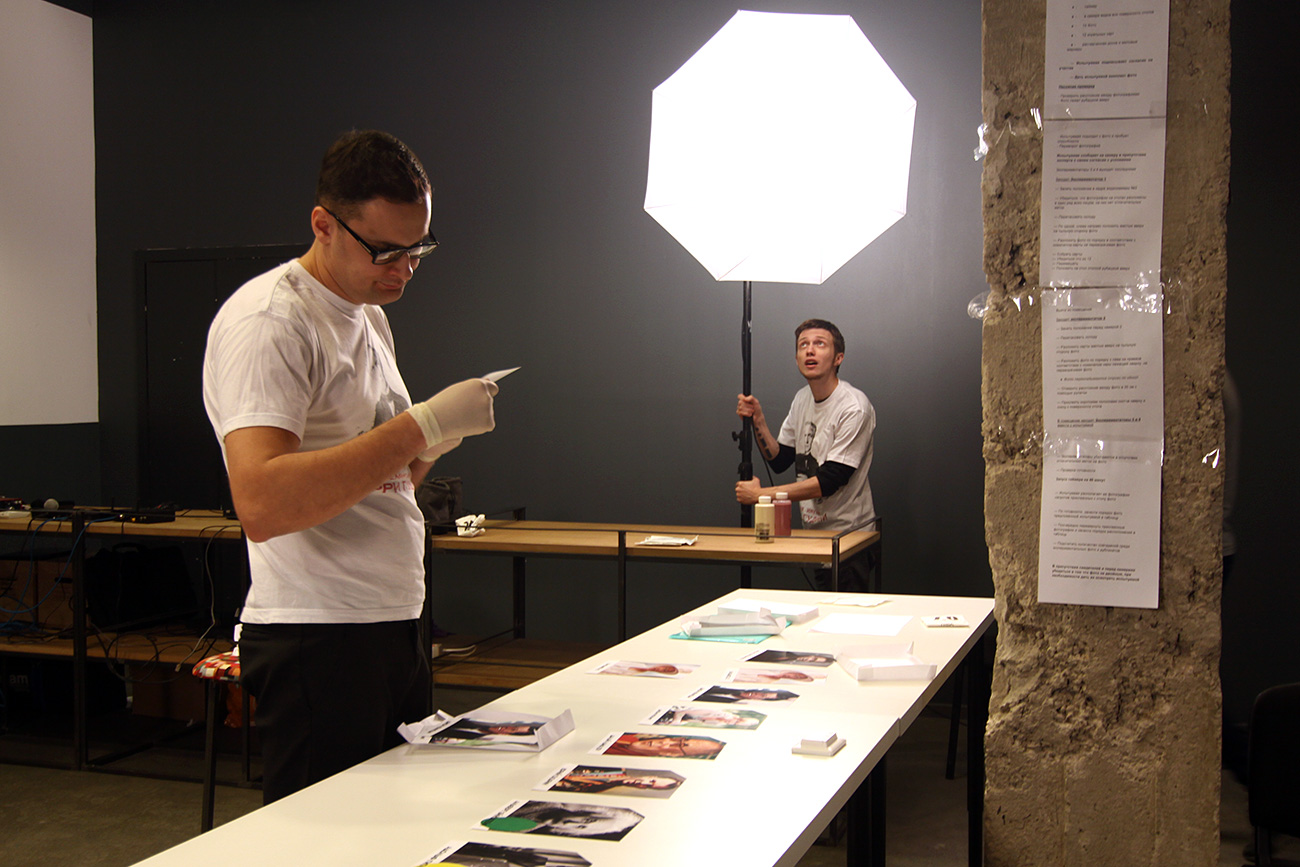 A man in latex gloves is neatly placing photographs of famous people on a table. / Photo: Victoria Ryabikova
A man in latex gloves is neatly placing photographs of famous people on a table. / Photo: Victoria Ryabikova
Lidin explains that such precautions are necessary because the preparation of the test must proceed strictly according to the rules. If one puts the photographs on the table without wearing gloves, one could not only "destroy the aura" but could also leave stains or fingerprints on the photographs that would help the psychic to cheat.
According to Lidin, this is the second attempt to check the abilities of psychic Olga Elchaninova. The first attempt took place in December 2016 when Olga, together with two other psychics, failed the test. However, there were minor breaches of the rules at that time, and now she wants to try again.
The Harry Houdini Award is only one example of a widespread trend in Russia. According to the All-Russian Center for the Study of Public Opinion (VTsIOM), 36 percent of Russians believe in the paranormal. The majority of believers are between the ages of 45 and 59. Natalya Kiselnikova, who has a doctorate in Psychological Sciences explains: "People have always sought to find an explanation for things they do not understand. It is what the ancients did - not knowing the basics of physics and biology, they began to believe in divine intervention. Some people turn to religion and others to psychics. People like to believe there are supernatural powers and knowledge that will help them and guide them in life."
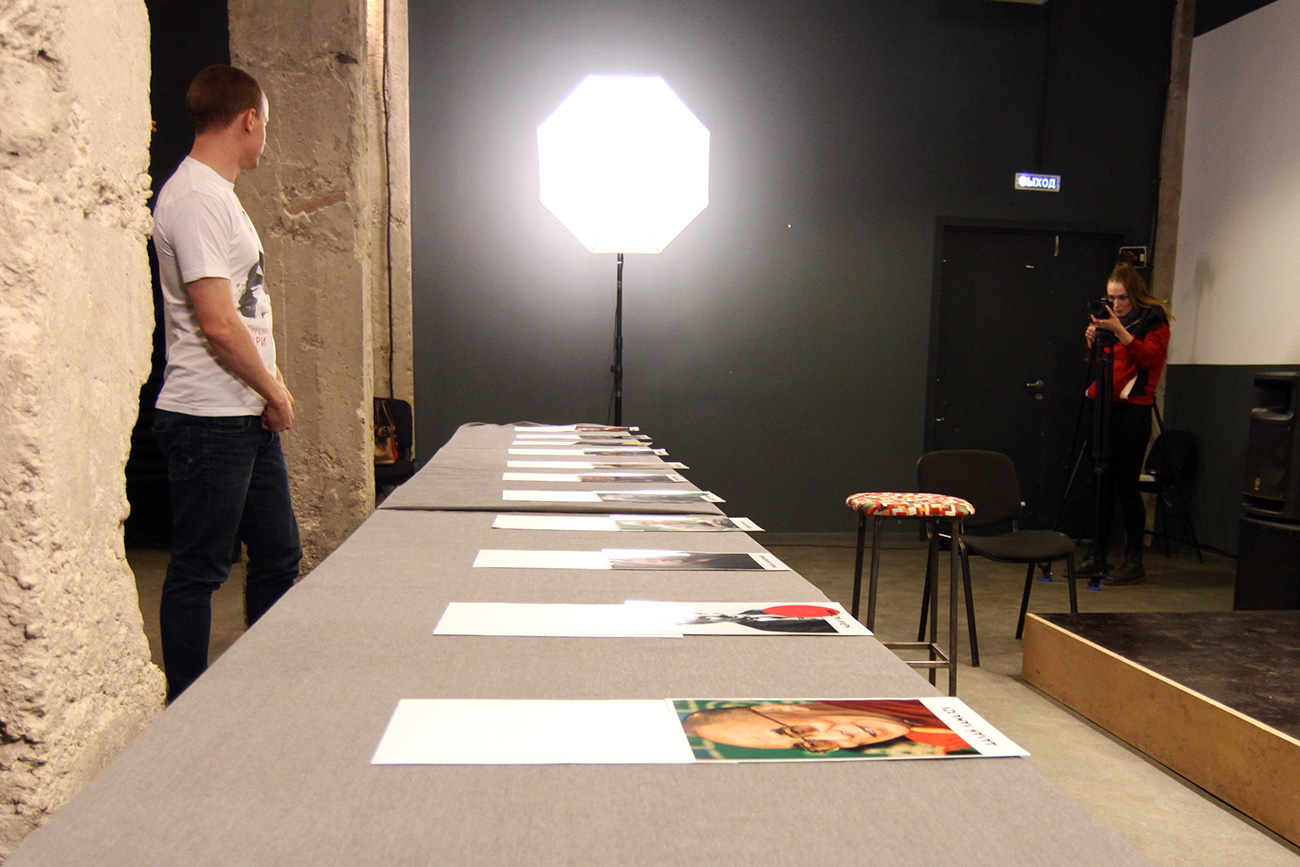 The distance between the photos should be at least 30 cm. / Photo: Victoria Ryabikova
The distance between the photos should be at least 30 cm. / Photo: Victoria Ryabikova
Another reason, according to Kiselnikova, is a low level of education (in particular, people who are not familiar with principles of scientific knowledge) and social instability: "When people lose direction and begin to fear for their future, they often turn to clairvoyants and fortune-tellers - this helps to reduce their stress levels."
The Harry Houdini Award is one way to satisfy this demand. To participate in the contest, candidates need to demonstrate their abilities to the organizers with a newspaper article, a scientist’s confirmation or a video recording. After the organizing committee considers the application, they devise a test for the psychic and carry it out.
Today's experiment will consist of two stages, head organizer Stanislav Nikolsky explains. Olga will then be invited to check the atmosphere in the room and look at the photographs to make sure that her ability is "working." After this, members of the jury will shuffle the photographs and place them face down in a such a way that even they don't know who is depicted underneath - it could be Elizabeth II or Albert Einstein. Then, the psychic is invited back into the room. She will have 40 minutes to identify the people in the photographs.
"We agreed on the photos with the applicant beforehand," Nikolsky said.
"But is it really fair?" a member of the audience interjects.
"The probability that the psychic will guess at least one famous person is 1:12. For their psychic ability to be recognized, the applicant needs to correctly guess at least six of the 12 photographs. That would really need a miracle. Let's give the girl at least a small hope of winning."
Telepathy can be a profitable business. According to Yuri Buziashvili, Moscow's chief cardiologist, Muscovites spend up to 30 billion roubles ($532 million) a year on the services of fortune-tellers and seers.
While members of the expert council for the Houdini Award are conducting their final preparations in the main room, in the corner of a neighboring room Olga herself, who could be accused of sorcery only for her beauty, is "practicing," full of hope, on copies of the photographs. She claims that during training she managed to "see" four of them.
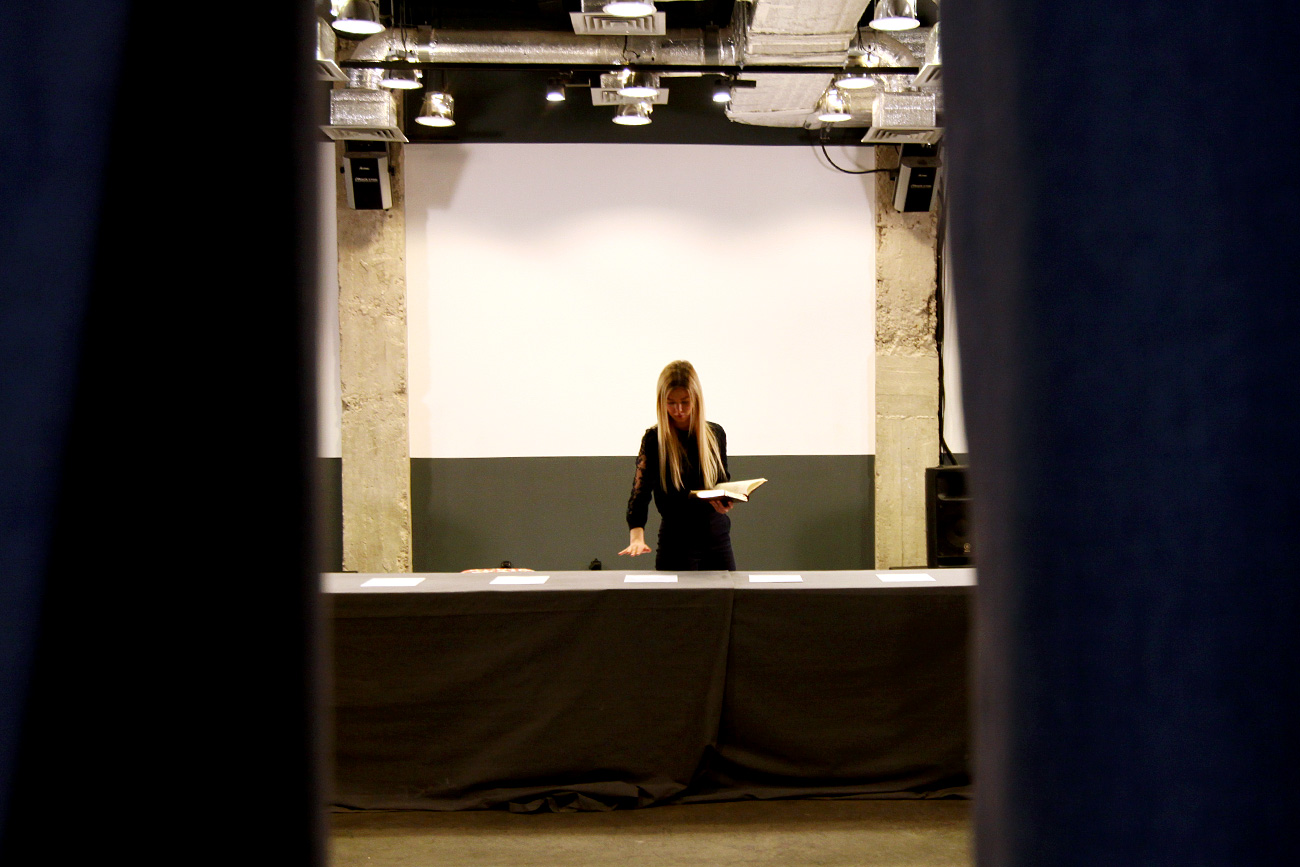 To participate in the contest, candidates need to demonstrate their abilities to the organizers. / Photo: Victoria Ryabikova
To participate in the contest, candidates need to demonstrate their abilities to the organizers. / Photo: Victoria Ryabikova
Not far from Olga, who aspires to be the winner of one million rubles, are two spectators: a striking 45-year old brunette and a young blonde who are sharing their experiences of visits to fortune-tellers.
"In the summer, through some acquaintances, I got a free appointment with a fortune-teller from Korea. There was an enormous line to see her, made up of people who paid to be told some general phrases about their interesting future and how to get rid of problems, and to be shown some performance with dolls and candles," the woman complained.
"But how could one not believe? In the end, you pay to be told that it is possible to get rid of problems with the help of a ritual," the blonde objected. "We all need to believe. A person describes his failures and receives the response they want to hear…," the young girl is interrupted by the main organizer invites the women to come see the experiment.
Extrasensory abilities and sorcery are a predominantly female fascination. According to the VTsIOM poll, 42 percent women believe in supernatural powers, compared to just 29 percent of men. Kiselnikova says the reason for this does not lie in the "female psyche" as some people like to believe. "Social factors and gender stereotypes play a big role. Perhaps in girls' education, less attention is paid to the development of their rational thinking, and their propensity for scientific knowledge is encouraged less," she tells RBTH.
In the main room of the Houdini assessment is a representative of the organizing committee, an independent expert and a cameraman. The spectators can only peep from behind the curtains, and people cannot approach the psychic during the test, so as not to ruin their mental state. Olga begins to move her hands mysteriously over an overturned photograph under a sheet of paper. She makes notes in a notebook, and then, with a concentrated expression, she moves on to the next one, repeating the ritual.
The silence is broken only by the sound of the camera and the barely audible whisper of the brunette who had been to see the Korean fortune-teller: "What if it works!"
No, it didn't work. As in the previous test, the applicant guessed only one photograph - this time it was the late Bulgarian clairvoyant Vanga, who is well-known in the territory of the former USSR. Instead of Charlie Chaplin, the psychic "saw" Marilyn Monroe, instead of Adolf Hitler she "saw" Barack Obama and instead of Yuri Gagarin there was Elizabeth II.
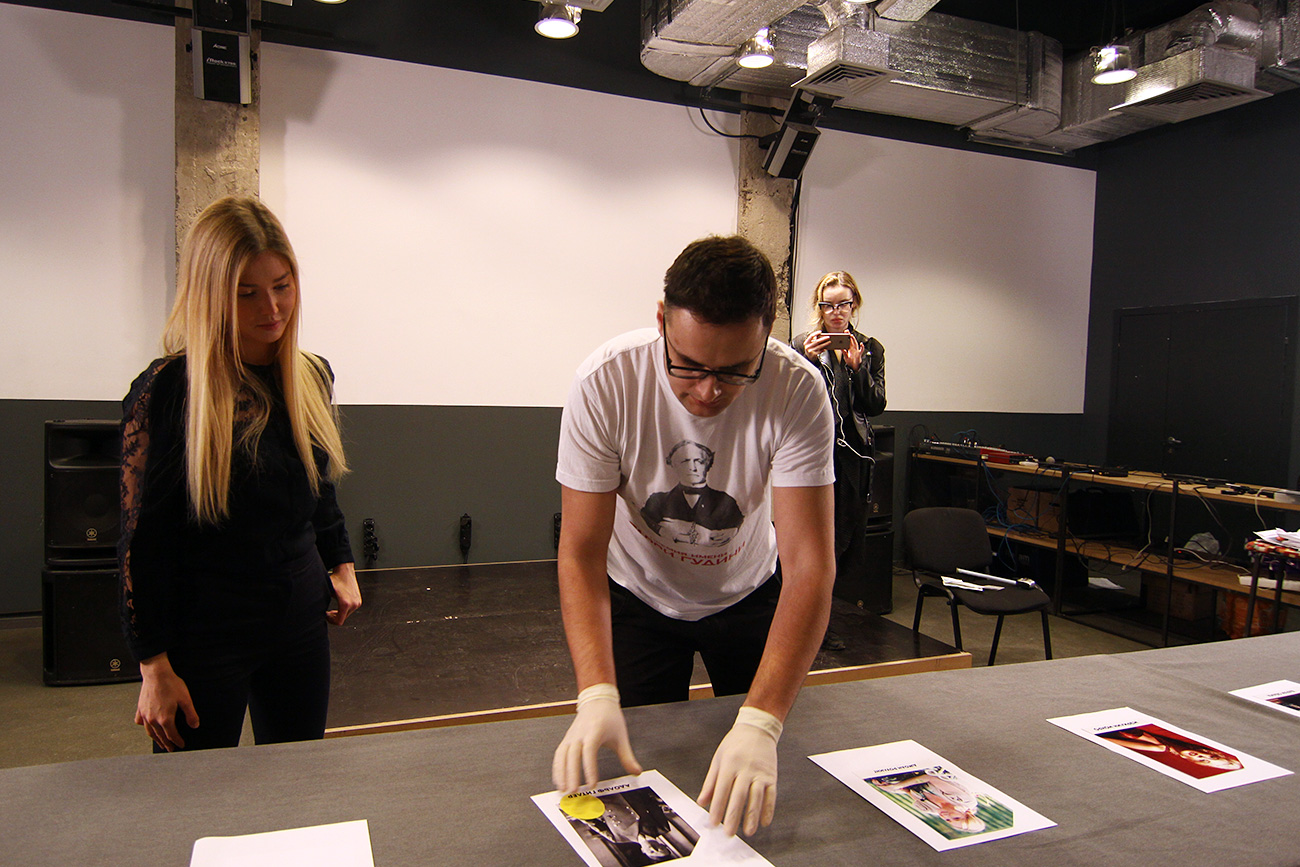 According to the poll, 42% women believe in supernatural powers. / Photo: Victoria Ryabikova
According to the poll, 42% women believe in supernatural powers. / Photo: Victoria Ryabikova
According to Olga, she can concentrate only on the first four photographs. After that tiredness overcomes her, and she begins to feel confused. Here’s how she describes it.
"Had there been more time, the result might have been better. Abilities appear randomly in certain situations. Once I was on a flight, going on holiday, and there was a foreboding that a plane would come down! And a plane did take a nosedive! But when I try to do it deliberately, I get stressed. I become shy, and nothing comes out. I am not claiming that I am a great clairvoyant. I simply wanted to test myself. I accept defeat."
Kiselnikova believes that all people are prone to misconceptions and erroneous conclusions: "We try to see patterns where they do not exist because we never have enough information to go on and we rely on our personal experience rather than statistics. For instance, a person can convince himself that they have the ability to have prophetic dreams. This person carefully observes coincidences between real events and the ones in his dreams. At the same time, they do not take into account the percentage of dreams that did not coincide with reality." According to her, this doesn't mean that the person has mental problems of some kind - they are simply mistaken, trying to make the world more predictable and understandable.
The main organizer of the event claims that the Harry Houdini Award is not trying to claim the impossibility of the existence of people with psychic abilities. This experiment only shows that today it proved impossible to record any such abilities, the same way it proved impossible to record them during the previous five tests of 15 psychics.
"Nevertheless, we should look for such people and tell other people about them. There are many things in the world that we do not understand. Any improvement in our picture of the world is good. And this is what we are doing," says Nikolsky. "If such a phenomenon exists and could be proven by scientific methods, this would enhance our picture of the world and help mankind understand the nature of the universe."
"Well, it went as expected," the brunette says, commenting on the results of the experiment with a slight note of disappointment in her voice. Then she carefully collects the photographs and puts them in her bag. "I'll just try and guess them at home myself," she replied, unperturbed, and as if in response to an unvoiced question from this RBTH correspondent.
What if she were to succeed in this endeavor? Would her picture of the world become a little bit more complete and her purse a little bit fatter?
If using any of Russia Beyond's content, partly or in full, always provide an active hyperlink to the original material.
Subscribe
to our newsletter!
Get the week's best stories straight to your inbox